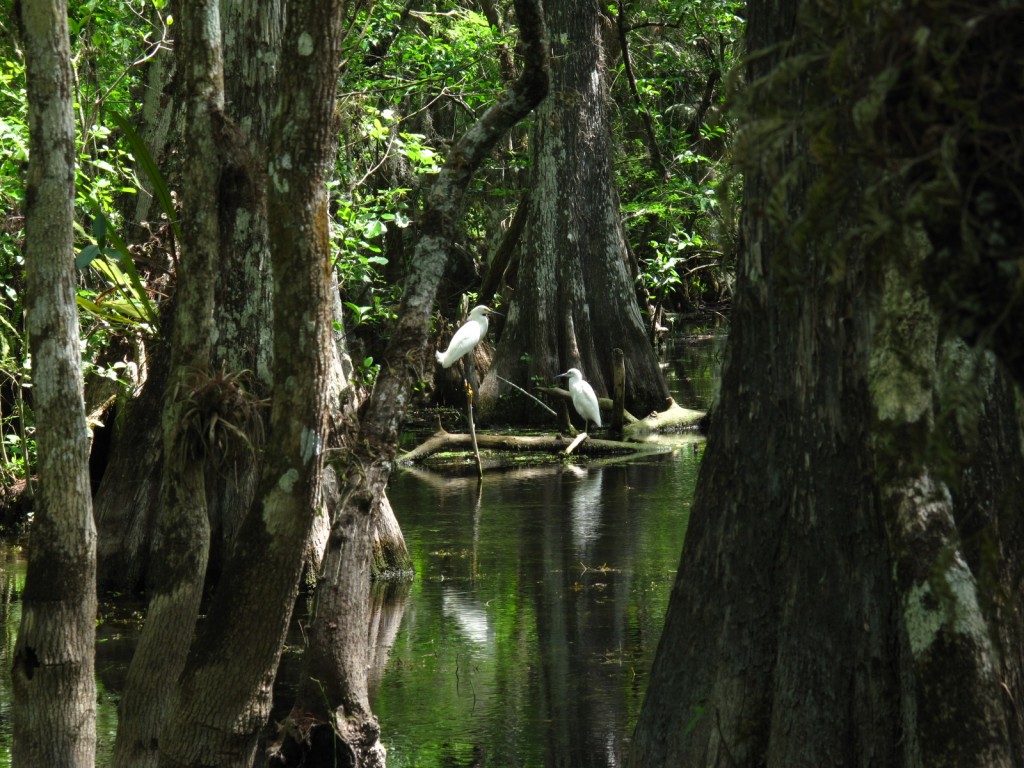By Sarah Cruz
Porous limestone, pumping aquifers, crystal clear springs, estuaries, birds, turtles, fish, manatees, panthers, birds, BIRDS. A slow moving river of grass. Drinking water, life. I really cannot articulate the magic, beauty, and life force that is Florida. Whether or not you’ve experienced the Everglades or other Florida wild lands, (it’s cool if you’re just the indoorsy type) we can all agree that drinking water is vital to all forms of life, both human and non-human.
The world over, water, land, and life are being murdered by capitalists’ desperate need to expand markets. Extraction, especially hydraulic fracturing or fracking, is expanding at alarming rates in North America. Pipelines are snaking their way from coast to coast. In Florida we know the Gulf of Mexico is littered with oil platforms and its waters are permeated with oil and Corexit, but we never imagined that drilling would hit land. We live atop porous limestone situated only feet above our water table and our aquifer system that provides the majority of the state’s drinking water.
Extraction, Injection Wells & Pipelines for FL
Over the past five years, Florida’s Department of Environmental Protection (DEP) has granted all but two of the 39 drilling applications submitted. “Sixteen of these have been applied for in the past year—14 of which are in Collier and Hendry counties…” (Newsweek) (1) Situated on the Gulf of Mexico, much of Collier County is in the Big Cypress National Preserve and is home to incredible estuaries, rookeries, and panther habitat. Hendry County borders Collier County to the northeast and is also part of the Everglades system, which should naturally flow from Lake Okeechobee (another mess).
Oil drilling has existed in the Everglades and in North Florida on a relatively small scale since the 1940s, but new technologies like horizontal drilling and acid fracking, coupled with the mad drive for new markets, are emboldening the industry to drill in regions, previously not considered. In Florida, one target area is the Sunniland Trend, which stretches from Ft. Meyers on the west coast to Miami on the east coast and includes parts of Collier and Hendry counties. (2)
Drilling also requires injection wells, which are concrete and steel tubes drilled hundreds or even several thousands of feet into the ground to store the byproduct of oil drilling and fracking. This toxic mix of salinated water and chemicals has been given the falsely innocuous term “brine.” We already have a number of injection wells in Florida, and we have seen that even those with the most stringent regulations are not safe. When 20 strictly-regulated disposal wells in South Florida failed in the early 1990s, partially treated sewage leaked into aquifers that housed potential drinking water for Miami. (3) Mario Salazar, a 25-year technical expert in the EPA’s underground injection program, has given dire warnings about our nation’s reliance on these precarious wells, “In 10 to 100 years we are going to find out that most of our groundwater is polluted.” (3)
In the first few months of 2014, the state DEP approved a permit requested by Texas based oil company Dan A. Hughes. It allowed exploratory drilling and an injection well in Golden Gate Estates, a residential community just northeast of Naples in Collier County. However, the DEP bypassed a required advisory committee that assesses dangers to the Big Cypress Watershed and makes recommendations about permits within the region. Because of the legal efforts of the South Florida Wildlands Association and other organizations, the DEP was forced to convene the committee after the fact and postpone the permit.
Some members of One Struggle, including myself, attended the March 11th public EPA/DEP hearing, packed with around 300 people from across the state. I stood in the back, angry, as we listened to the Big Cypress Swamp Advisory Committee drone on with bureaucratic proceedings and misinformation. A comrade asked, “Should we disrupt this? This is maddening!” A man standing next to me vented loudly, “This is a ring and circus!” A Golden Gate resident demanded, “How could this committee, charged with making a recommendation to the DEP about this permit, know so little about the issue?” Soon the room swelled with anger. Shouts from the crowd quickly overtook the orderly proceedings. Claims made by state and oil industry officials about the expected minimal impacts to water quality and endangered panthers were met with cries of “bullshit!” Every attempt to quiet or pacify the crowd was met with combativeness. It was awesome.
Eventually the committee decided they couldn’t make a recommendation that day. They scheduled another meeting for March 31st, and more people showed up to that meeting to demand they reject the permit. Eventually they did. But this is not quite a victory. The Big Cypress Swamp Advisory Committee only provides a recommendation to the state DEP, which is not legally binding.
As of April 15th, the Florida Department of Environmental Protection notified Judge Alexander and the Florida Division of Administrative Hearings that it intends to ignore the recommendations of the Big Cypress Swamp Advisory Committee to deny the Golden Gate oil well permit. A state DEP lawyer argued that the committee’s recommendation against the permit was “beyond the Department’s purview” and that “there is no basis, under its existing regulatory authority, to deny the application.” (4) Judge Alexander in Tallahassee will make the final decision.
Meanwhile, Spectra Energy and Florida Power & Light (a subsidiary of NextEra) have natural gas pipeline projects in the works for Florida. The Southeast Market Pipeline would link lines from the Marcellus Shale region down to Alabama, Georgia, and Florida. (5) FPL is also currently pushing for a 3,750-megawatt gas-fired power plant in Hendry County. (6)
The fight for the Everglades, the fight against capital’s devastation of life, has always been a fierce one. The intensity will only amplify.
Resistance
We are facing a catastrophic situation, but this moment also presents an opportunity to organize. Environmental crisis makes so clear the destructive and insane nature of capitalism. It’s a literal dead end, as capitalists invest in our very destruction. (7)
The struggle to defend our land and water must be directly tied to the death of this system.
We need a movement to do this, a broad one filled with all kinds of people, all participating for varying reasons, but unified against one common enemy—capital.
Retirees, landowners, suburban housewives, fisher people, NGOs, indigenous leaders, students, radicals, progressives—almost everyone at the March 11th hearing was ready to fight for land and water. This was really encouraging but if our goal is a classless and sustainable society, we must go further. We must connect the dots between ecocide and capitalism so that our efforts are not co-opted and recycled back into the system.
We cannot afford to be derailed by voting, fighting for property rights, symbolic actions, allowing NGOs to lead our fight, or false divisions. Reformist struggles can play a positive role, but only when we engage in them strategically, with the larger objective of building a combative mass movement.
I’m grateful to folks who work within the legal system to slow the rate of destruction, but a mass of organized people in the streets can impose their demand rather than jumping through bureaucratic hoops to ask nicely.
I admire the bravery of folks who shut down extraction sites, but what about the people who work at those sites? They are not our enemies. They are dominated by capitalism as well, compelled to work jobs that destroy their children’s land, water, and air.
This is why we need a broad movement that goes beyond single issues and makes the connection that all of us, dominated and exploited by capitalism, must unite. One Struggle is organized around this concept—uniting all who can be united at this moment; growing organized relationships and networks of people who agree that capitalism must die; and determining how we can fight together. This is why we attended this hearing. Here is the leaflet we handed out. (8)
We will never all agree about the exact details of what a new society should look like, nor how to get there (nor should we), but if we can unify against the cause of our destruction, we can be powerful in our work to defeat this system, to defend land, air, and water for human and non-human life. We must. It is so urgent.
1. http://www.newsweek.com/2014/02/28/oil-prospectors-seek-their-next-big-strike-south-floridas-everglades-245596.html
2.http://www.collierresources.com/About_CRC/Sunniland_Oil_Trend_Big_Cypress_Preserve
3. http://www.propublica.org/article/injection-wells-the-poison-beneath-us.
4.http://blogs.browardpalmbeach.com/pulp/2014/04/dep_drilling_everglades_hughes.php
5. http://www.ogfj.com/articles/2014/01/miami-2017-marcellus-gas-heading-to-florida.html
6. http://earthfirstjournal.org/newswire/2014/04/06/spectra-seeks-approval-to-send-gas-pipeline-into-the-southern-swamps/
7. https://www.commondreams.org/view/2014/03/31-6
8. https://onestruggle.net/wp-content/uploads/2014/03/OSfracking.pdf






